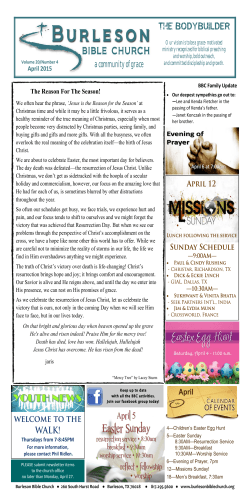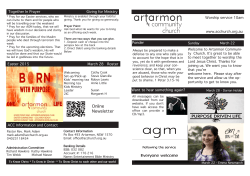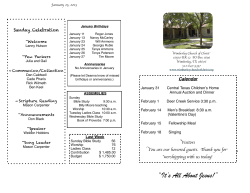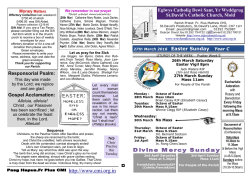
Homily for Easter Morning 2015 - Our Lady
Homily for Easter Morning 2015 “You must have heard about Jesus of Nazareth” (Acts 10:17) In the light of Easter morning these words of the Apostle Peter echo with a special poignancy for the people of our country at a time when it is our political leaders who seek to articulate Britain’s values. If almost a third of British children now believe that today marks the Easter Bunny’s birthday, then we can see why it is more necessary than ever to hear, as the Apostle urges, about Jesus of Nazareth. It is in the light of His Cross and Resurrection that we have long recognised what a human being is worth and what we should truly value in our lives. It is this Christian faith which has been without doubt the most important formative influence in our history ever since a once “savage people” (as one historian describes us!) were converted to “Christ’s gentle creed of love and sacrifice and the revolutionary belief, inherent in Christianity, that every individual was a soul of equal value in the eyes of God” (A History of Britain and the British People, Sir Arthur Bryant Vol.1 1984). On this Easter day we celebrate the fact that humanity was not abandoned to the power of sin and death: in Christ’s Resurrection we have been raised to a new life, a new dignity. As Christians we have no need to trace family trees or research our genetic origins to reveal who we are. St. Paul declares this morning: “When Christ is revealed and he is your life –you too will be revealed in all your glory with him” (Col. 3: 4). In Christ, we recognise the truth about our dignity, our destiny and our highest calling which no ideology or earthly power can ever take away from us, for, as St. Paul explains: our life is hidden “with Christ in God” (Col.3:3). In order to counter violent and extremist ideologies, the Government has sought to establish a set of ‘British values’ to which all in our country must subscribe. It has left many uneasy because our values cannot be arbitrarily formulated by any passing generation of politicians even if they have the best of intentions. Our values will always emerge from what we truly believe about ourselves and beg the question why do we believe that every human being has innate worth and is endowed with equal rights and dignity? Pope Francis left the European Parliament in no doubt in November of last year when he declared only “a Europe capable of appreciating its religious roots and grasping their fruitfulness and potential” will be “immune to the many forms of extremism spreading in the world today”. Pope Francis pointed out how Europe had been re-‐built after the Second World War by a renewed confidence in “men and women as persons with transcendent dignity” which flows from the Christian faith (Address to the European Parliament 25th November 2014). In other words, it is by faith in what a human being is, rather than by what any political leader says we are, that human rights are truly safeguarded. Pope Benedict made this same point to our own political leaders in Westminster Hall five years ago: “By appeal to what authority,” he asked “can moral dilemmas be resolved? … If the moral principles underpinning the democratic process are themselves determined by nothing more solid than social consensus, then the fragility of the process becomes all too evident – herein lies the real challenge for democracy” (Address Westminster Hall. 17th September 2010). Pope Benedict had himself seen in Germany a violent, racist and anti-‐Christian movement come to power not by the bomb or the bullet but through the democratic process. He concluded that the world of secular rationality and the world of religious belief need one another if the good of our civilization is to be secured. As our country engages in long weeks of debate prior to the General Election on May 7th, the Catholic Bishops of England and Wales have sought to underpin these values on which our country and civilization has long stood. We do not seek to formulate policies; still less to take a party political stance. This is the task and vocation of politicians who have a vital and necessary vocation. As bishops, we wish no more than to allow what the Easter Liturgy calls “the gentle light of Christ” to shine on all human affairs and the questions which confront British society in 2015. We repeat in this way the words of the Apostle this morning: “you must have heard about Jesus of Nazareth …” In His clear and gentle light, we see why it is we must care about each other and not see any human being simply in terms of economics or usefulness; why we must safeguard the value of every human life born or unborn, young or old, sick or healthy; why we must protect the family as the most precious cell of society where each man and woman is “nurtured.” In Him “who went about doing good and curing all who had fallen into the power of the devil” (Acts 10:38) we will always be able to see what we must value and what upholds human dignity and flourishing in every generation. It is this light which has guided our nation from its beginnings and continues to guide all those who today come to know Christ Jesus our Lord. + Mark Bishop of Shrewsbury
© Copyright 2026














